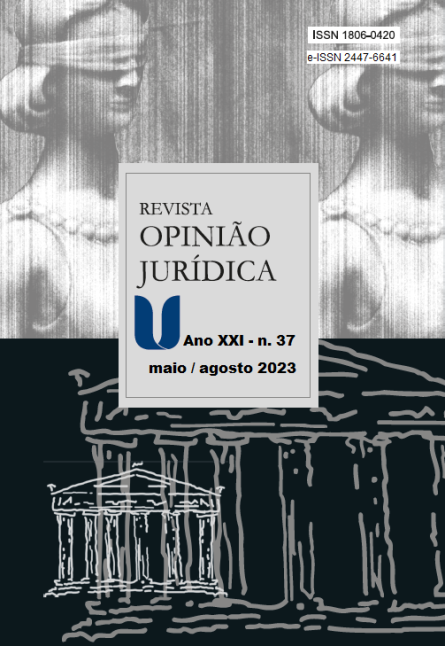POLÍTICAS PÚBLICAS DE SEGURIDAD EN ESPAÑA. ANÁLISIS DESDE PERSPECTIVAS CRIMINOLÓGICAS
DOI:
https://doi.org/10.12662/2447-6641oj.v21i37.p183-211.2023Palavras-chave:
criminología, delincuencia, inseguridad ciudadana, seguridad ciudadana, seguridad pública.Resumo
Objetivo: La seguridad pública se considera un componente del bienestar social, donde por lo general, mediante un Estado de derecho que genere condiciones idóneas para el desarrollo, y generar en la ciudadanía la plena confianza de que la vida, el patrimonio y otros bienes jurídicos estén exentos de peligros. Todo ello, junto con un buen número de factores configuran lo que Ullrich Beck (1992), denominó la Sociedad del riesgo, que se resumiría en el aumento de la exigencia social hacia un control de todos los elementos peligrosos de procedencia humana. El propósito de este trabajo es observar una panorámica sobre el proceso y diseño de las políticas públicas con el fin de reducir la delincuencia. Las políticas de seguridad pública se convierten en el principal elemento de cada nación para tratar de disminuir la problemática de la inseguridad pública. En España se ha pasado de un modelo estrictamente punitivo frente a la delincuencia, hacia un enfoque preventivo, lo que se ha traducido en mejorar condiciones y ambiente en la población, para fomentar otro tipo de actividades que limiten o alejen al individuo de un comportamiento delictivo, con el objetivo, en este de identificar que plan de acción han seguido las políticas de seguridad pública que se ha implementado en España con el fin de reducir la delincuencia.
Metodología: Para la realización del presente trabajo se ha realizado una Investigación pura (básica) con la finalidad de ampliar y profundizar el conocimiento de estudio. El método utilizado ha sido el cualitativo, por medio de las fuentes materiales y culturales se ha obtenido una información valiosa para poder exponer el problema. Por las características externas de las fuentes consultadas, se ha utilizado la bibliográfica y documental ya que el proceso de técnicas realizadas para la recolección, selección, clasificación, y análisis de la información nos servirá, a priori, para la elaboración de la investigación sobre las políticas públicas en seguridad, observando y reflexionando sistemáticamente sobre las realidades teóricas desde distintas perspectivas criminológicas. Toda la investigación biográfica y documental llevada a cabo para la realización del trabajo, han seguido los criterios de selección de pertinencia, exhaustividad y actualidad.
Resultados: Para la medición de la seguridad, debemos atender tanto a la dimensión objetiva, relativa a la incidencia de eventos delictivos registrados, como su dimensión subjetiva, relativa a la percepción acerca de la peligrosidad que reviste transitar por un determinado espacio. Una parte importante de los delitos la sufre un número muy limitado de personas que son victimizadas en repetidas ocasiones. Además, es frecuente que un pequeño grupo de infractores sea responsable de una parte importante del total de delitos. Si completamos esta perspectiva con el aspecto geográfico (hot spots), el temporal y de contagio, podremos establecer mecanismos más eficaces de prevención y reducción de la delincuencia. Encuestas de victimización recurrentes reforzarían la visión total de la seguridad y la prevención.
Conclusiones: Para prevenir el delito los poderes públicos deben recurrir a la Criminología y complementar sus agendas de seguridad publica mediante modelos de prevención situacional, comprometiéndose a aplicar medidas adecuadas basadas en los hallazgos científicos y evaluando siempre sus resultados mediante estandares de calidad, para ser eficientes en el uso de los recursos públicos. Se anhela por la generalidad de las políticas publicas en seguridad poder plasmar una propuesta a manera de aproximación a medio-largo plazo con el fin de reducir la incidencia delictiva, pero necesariamente, concibiendo al fenómeno delictivo como una actividad que en mayor o menor medida, continuara estando presente en las sociedades.
Downloads
Publicado
Como Citar
Edição
Seção
Licença
TRANSFERÊNCIA DE DIREITOS AUTORAIS
A submissão de artigo à apreciação da Equipe Editorial da Revista Opinião Jurídica implica, por este mesmo ato, a cessão, por parte do(s) autor(ES), para o Centro Universitário Christus – UNICHRISTUS, da referida OBRA para fins de reprodução, divulgação, distribuição, impressão, publicação e disponibilização, em qualquer forma ou meio que exista ou venha a existir, nos termos do art. 49 e os seguintes da Lei 9.610/98.
Parágrafo Primeiro. A cessão, objeto deste Termo, é feita a título não exclusivo e gratuito, abrangendo a totalidade da OBRA.
Parágrafo Segundo. A UNICHRISTUS poderá disponibilizar, para fins didáticos, a OBRA no todo ou em partes, vedada a alteração de seu conteúdo textual, ressalvadas correções e formatações que se fizerem necessárias.
Parágrafo Terceiro. A cessão é válida em quaisquer países, em língua portuguesa ou tradução, a critério da UNICHRISTUS.
DAS RESPONSABILIDADES
Ao submeter(em) artigo de sua lavra, o autor (e co-autores, se houver) assume(m), por este ato, a responsabilidade exclusiva pela integralidade do conteúdo da obra de sua autoria. Dessa forma, quaisquer medidas judiciais ou extrajudiciais concernentes ao seu conteúdo serão de sua inteira responsabilidade.
Parágrafo único. Em caso de pluralidade de autores, considera-se solidária a responsabilidade, ressalvadas as provas em contrário.































